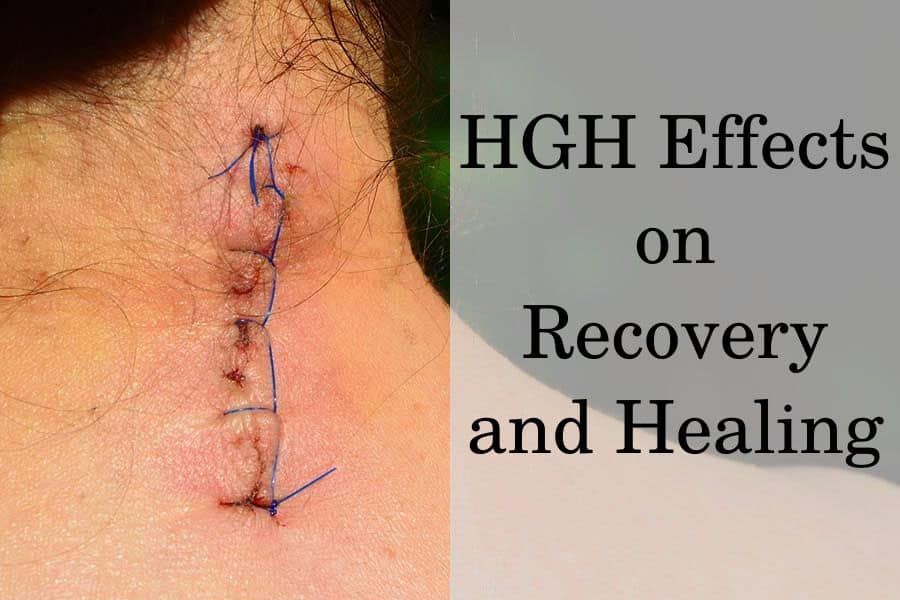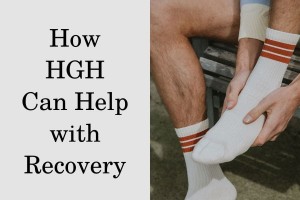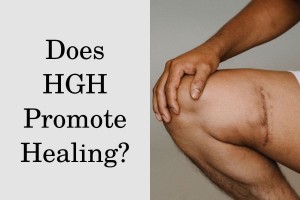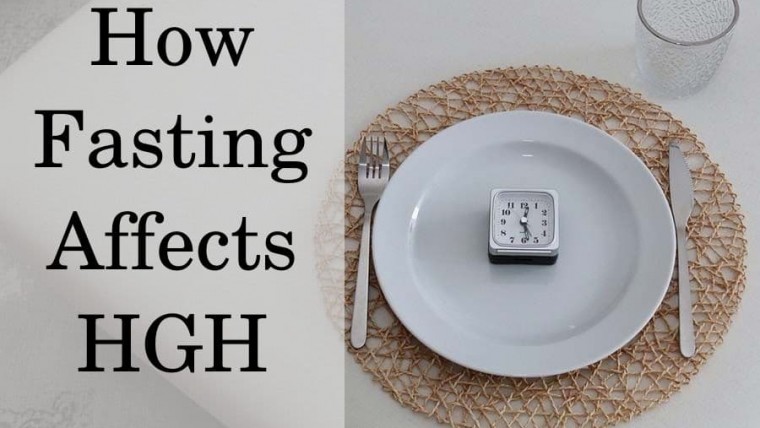In this article
HGH is an anabolic hormone that reduces muscle loss, stimulates cell division, and increases tissue growth. Due to its anabolic effects, HGH may help you retain more muscle mass during recovery from events such as injuries and surgeries.
However, such circumstances are not medical indications for HGH injections, and the therapy is not legally available for recovery or healing from physical trauma.
FDA recommends HGH treatment for specific medical indications only. In adults, they include growth hormone deficiency (GHD), short bowel syndrome, and muscle wasting due to HIV/AIDS
It’s important to note that one of the potential causes of GHD is an injury to the brain. About 22% of the patients with brain injury develop GHD and in those cases, HGH therapy can help relieve the symptoms and speed up rehabilitation.
If your doctor has prescribed you HGH therapy for any of these indications, they may consider increasing your dosage following surgeries or injuries to speed up various aspects of your recovery process.
One of the most studied effects of HGH injections following surgeries or injuries is increased muscle retention which may lead to quicker rehabilitation.
There is also preliminary data that HGH may speed up the healing of some tissues thanks to its stimulating effect on cell division and tissue growth. However, these effects are poorly studied and need more research.
In this article, you will discover more about the potential benefits of HGH on recovery and dive deep into the research on whether HGH may help speed up healing after injuries.
How HGH affects the recovery
HGH therapy has well-known anabolic effects on muscle tissue. This makes it effective for increasing lean mass in patients with GHD and reducing muscle loss in wasting syndrome such as HIV/AIDS.
Studies also show that HGH can help reduce muscle wasting following injuries, immobilization, and moderate or severe surgeries.
Furthermore, the medication may help you retain your muscle strength which helps the recovery process, and you may speed up the rehabilitation back to your normal lifestyle.
In one trial, patients who took HGH injections retained much more muscle mass and strength after major surgery compared to the placebo group. They were given 3 mg (12 IU) of HGH per day for the 2 days before and the 7 days after surgery. The patients taking HGH lost less than 8% of their muscle strength by the 10th postoperative day, compared to the placebo group, who lost more than 17%.
Furthermore, they fully recovered their muscle strength by the 90th postoperative day and experienced lower fatigue levels compared to the placebo group, who were still 5.9% weaker compared to their strength levels before the surgery.
Other studies also report that doses as high as 0.1 mg per kg of body weight given only for 6-days can help patients retain more muscle mass and mobilize more fats as an energy source when recovering from surgeries.
In general, the dose given for recovery ranges from 1-5 mg per day, and the therapy lasts for up to a week. It’s important to note that such doses are much higher compared to those recommended in the long-term treatment of GHD.
Which HGH brands are best for post-surgery recovery?
Any FDA-approved brand of HGH which your doctor has prescribed for you can be effective for recovery. Some of the FDA-approved brands in the US include Norditropin, Genotropin, Humatrope, Saizen, and Omnitrope.
Keep in mind that purchasing an FDA-approved brand from a pharmacy that requires a doctor’s prescription is the only way to feel confident that you will receive a genuine, safe, and effective product.
Can HGH help to heal after surgery?
Scientists are investigating the potential of HGH therapy for supporting recovery after various surgeries. Currently, researchers have studied the potential of HGH in recovery after orthopedic and abdominal surgeries.
The effect of HGH on other types of surgeries such as anterior cervical discectomy and fusion (ACDF), neck, and cardiac surgeries lacks research and remains unknown.
Orthopedic surgeries often require immobilization, leading to muscle mass and strength loss in the affected body part. Studies also show that 7 days of hospital stay lead to a significant overall loss of lean mass.
Research reveals that HGH may be able to prevent these effects following surgery, thanks to its anabolic properties.
One trial in men who underwent anterior cruciate ligament (ACL) reconstruction showed that those who also took HGH recovered the strength in the affected leg much faster compared to the patients on placebo.
The patients on HGH took 1 mg of HGH for 5 weeks, and the researchers also found that they had much lower levels of markers for cartilage degradation after knee surgery. Therefore, the HGH may potentially have a protective effect on the joint as well following the surgery.
However, another study in patients with rotator-cuff tears reported that HGH therapy did not accelerate healing following shoulder surgery.
Scientists have also studied HGH therapy as a potential tool for reducing muscle loss after gastrointestinal surgery.
Muscle loss is common following abdominal surgery because the patients often require parenteral nutrition and undergo a refeeding phase that cannot deliver enough calories to prevent catabolism.
A study of 216 patients who underwent a moderate or major abdominal surgery reveals that HGH was much more effective than a placebo in helping them retain more lean body mass. Furthermore, HGH therapy helped reduce postoperative fatigue and even the risk of postoperative infection in the treated individuals.
HGH therapy hasn’t been studied following abdominal surgeries for diverticulosis
However, the therapy may not be suitable for patients with colon diverticulosis, as research shows that individuals with high growth hormone levels are more likely to develop the condition.
Some types of surgeries can also lead to GHD as a complication. Those include brain surgeries and especially surgeries on the pituitary gland.
In such cases, HGH therapy will become necessary to manage the complaints in these patients, and it can be legally prescribed to relieve the symptoms of GHD.
How HGH affects the healing process
Scientists are actively investigating the potential of HGH to affect the healing process in various tissues. HGH therapy may help speed up tissue healing thanks to its stimulating effects on cell division and proliferation.
Many organs, such as your skin and liver, heal primarily through the proliferation of their cells. Therefore, HGH may stimulate healing on a cellular level, and its effects are permanent.
According to scientists, these tissues possess a gene called Foxm1, and by activating it, HGH can stimulate tissue healing and recovery. The study found that HGH can stimulate liver repair and healing in old mice with liver damage. In fact, the rate of healing matched those observed in young mice.
Human studies in patients with obesity and fatty liver report that at least 6 months of HGH therapy was effective at improving certain functional indicators such as liver enzymes. The patients received 0.5 mg of HGH a day for 24 weeks.
However, it’s unclear whether this is due to the growth hormone effect on cell proliferation or due to its fat-loss effects.
Scientists are also investigating whether HGH may facilitate or speed up the healing of tissues consisting of cells with limited ability to proliferate, such as neurons. Currently, the studies are mostly preliminary and limited to test animals.
One experiment with mice suffering from photochemically induced stroke reported that those treated with HGH lost less brain tissue compared to the control group and recovered some of their cognitive abilities faster.
One of the few studies in humans reported that 6 months of therapy with HGH was much more effective than a placebo in helping patients with spinal injury to recover some of their perceptions. The daily dosage used in the study was 0.0125 mg per kilogram of body weight.
Yet, the research is only preliminary, and there is no sufficient evidence to recommend HGH for healing after brain injuries.
Does HGH help heal injuries?
Researchers have studied the potential of HGH therapy primarily for healing musculoskeletal injuries as well as wound healing.
Currently, several studies are showing that HGH may help speed up wound healing, primarily because the hormone can accelerate the proliferation of various skin cells.
According to one of the trials, HGH injections led to 25% quicker recovery than placebo in children with skin burns. These benefits led to a significantly shorter hospital stay and lower risk for infection in those patients.
Another trial also reported that HGH therapy reduced mortality from complications in adults with severe burns by 16%.
In comparison, the studies regarding the healing potential of HGH on the musculoskeletal system are mostly preliminary.
For example, there are only a few human studies investigating the potential of HGH in healing bone fractures, despite the fact that the hormone has well-known effects for increasing bone density.
According to one of the trials, HGH therapy for 16 weeks led to significantly faster healing of closed bone fractures but did not affect the healing process in open bone fractures.
One of the most interesting topics is the potential of HGH therapy to affect joint health mainly because the current options to reverse injuries to the joint cartilage are highly limited.
However, the only studies showing any beneficial effects of HGH on “wear and tear” injuries to the cartilage involve injecting the hormone directly into the joint. The scientists gave a single injection inside the knee joint to 44 patients with osteoarthritis.
One month after the injection, the researchers reported that there was a significantly greater improvement in the patients who received HGH regarding their levels of joint pain and stiffness.
Unfortunately, there is not enough evidence to recommend HGH injections into the joint because most of the potential side effects from such a procedure are still unknown.
Does HGH heal tendons and ligaments?
Tendon and ligament injuries are some of the most common traumas in sports, including bodybuilding. Therefore, both athletes and scientists are interested in the potential of HGH to speed up the recovery of such injuries.
Unfortunately, the evidence is still preliminary and consists mostly of animal and in vitro studies. Currently, the experiments suggest that HGH may speed up the healing of injured and torn tendons thanks to its stimulating effect on collagen synthesis.
Indeed, one study in mice reported that HGH could stimulate growth, remodeling, and collagen synthesis in tenocytes via its main anabolic mediator – IGF-1.
Another animal trial also reports that HGH can help reduce inflammation in torn tendons, which also helps facilitate healing.
Currently, there are no clinical studies regarding the potential of HGH for repairing torn or injured tendons and ligaments. Therefore, we cannot draw conclusions on whether HGH therapy may speed up healing in some of the most common injuries, such as torn shoulders and biceps tendons.
One small human trial in healthy individuals reports that HGH may be capable of strengthening the patellar tendon by stimulating the formation of new collagen.







